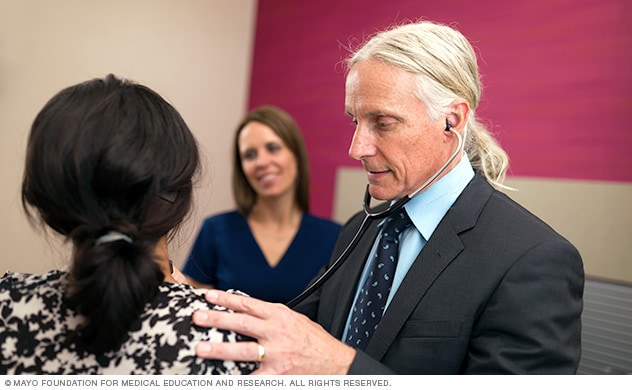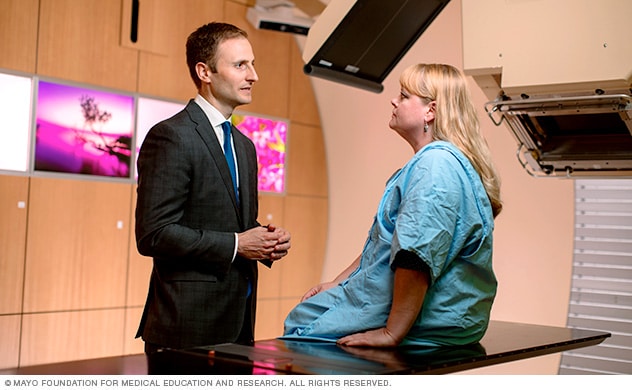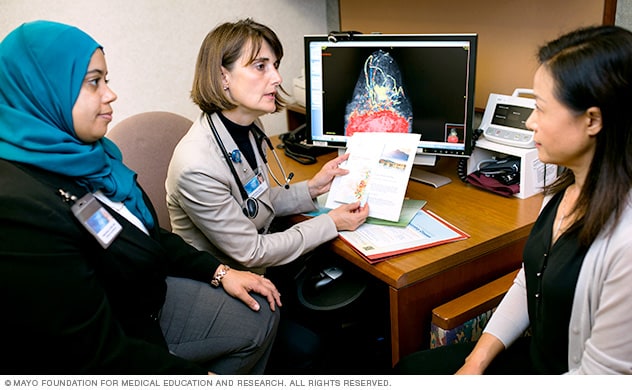Mayo Clinic's approach

Mayo Clinic doctors offer expert care for people with breast cancer.
Mayo Clinic breast cancer specialists provide compassionate, comprehensive care for people with breast cancer during and after treatment. The range of supportive care and survivorship services aims to ensure that all of your needs are met, so you can focus on healing and wellness.
Your Mayo Clinic care team
During and after your breast cancer treatment, you'll be cared for by a team of experts who work together to personalize your therapy and address your concerns, providing hope and trust through your cancer journey. Services are usually coordinated by a breast cancer specialist in the Breast Clinic who meets with you to understand your concerns and schedules appointments with specialists.
Your care team might include:
If you have other health concerns that might be affected by breast cancer treatment, your breast cancer specialist can coordinate those appointments as well. Mayo Clinic offers world-class experts in all specialties in one place to allow multiple appointments to be coordinated over a matter of days.

Breast cancer specialists work to reduce side effects and make you comfortable during treatment.
Supportive therapy to help you feel better
Your breast cancer specialist will do an assessment of your needs shortly after your diagnosis to discuss your goals and make arrangements for you to meet with various specialists to address your concerns.
Supportive therapy for breast cancer is focused on keeping you comfortable during treatment so that you can continue your usual daily activities as much as possible.
Supportive therapy services might include help with:
- Arm swelling, also called lymphedema, that can occur after surgery or radiation. Specialists in the lymphedema clinic offer treatments that can improve your arm function and reduce your discomfort.
- Pain management for pain caused by chemotherapy-induced peripheral neuropathy and surgery- or radiation-related breast or chest wall pain.
- Regaining function and stamina if treatment has caused shoulder pain or stiffness, weakness, fatigue, or difficulty returning to the activities that you enjoy. Cancer rehabilitation specialists in physical medicine and rehabilitation can work with you on your specific needs and tailor treatment to your abilities.
- Controlling symptoms through integrative therapies such as massage, acupuncture and others offered by specialists in integrative medicine.
- Wellness coaching and classes, including those offered by the Mayo Clinic Healthy Living Program.
- Planning for and coping with loss of fertility with reproductive endocrinology specialists who can help you understand how treatment may affect your ability to have children in the future and discuss options for preserving fertility.
- Managing menopause symptoms with help from specialists in the Women's Health Clinic.
- Managing sexual dysfunction with help from sexual health specialists.
- Sorting out your feelings, managing stress and devising coping strategies with counseling and other options in psychiatry and psychology services.
- Coping with everyday concerns such as financial questions, transportation logistics and caregiver services with help from our social workers.
- Thinking and memory changes that can occur after cancer treatment, including chemo brain.
- Nutritional counseling from dietitians who can offer support and tips if you experience difficulty eating or if you need help losing weight.
- Stopping smoking through counseling and medicines from compassionate experts in the Nicotine Dependence Center who can help you devise and implement a plan to quit.
- Heart concerns from doctors in the Cardio-Oncology Clinic who evaluate and treat people who have heart disease or who are at risk of heart disease before, during and after treatment for cancer.
- Kidney concerns from doctors in the Onco-Nephrology Clinic who evaluate and treat people who have kidney disease caused by cancer or cancer treatment.
- Sleep problems if you experience difficulty getting to sleep or staying asleep, with help from specialists in sleep medicine.
- Educational services and classes through the Cancer Education Program, which offers reliable reference materials and classes taught by experts.
- Making healthy lifestyle choices through healthy diet, physical activity and stress management to improve your health during and after treatment. Breast cancer specialists can connect you with services such as the Mayo Clinic Healthy Living Program and community exercise programs.

Specialists who focus on care for breast cancer survivors create individualized follow-up plans.
Personalized care for breast cancer survivors
At Mayo Clinic, breast cancer survivors meet with an expert who specializes in cancer survivorship at the end of cancer treatment. Cancer survivorship clinics provide comprehensive care that helps you live well after cancer treatment.
You can expect the expert to:
- Review lingering symptoms and concerns that remain after treatment. You'll be connected to other experts and programs that can address your concerns.
- Provide a treatment summary for your records that explains your diagnosis and treatments.
- Create a customized follow-up care plan that includes a schedule of exams and tests that are recommended for you based on your diagnosis and treatment.
- Explain the signs and symptoms of cancer recurrence and when you should make an appointment to investigate any new signs or symptoms.
- Make wellness recommendations to help you recover from breast cancer treatment and reduce your risk of cancer recurrence. If you need help losing weight or starting an exercise program, you'll receive referrals to get you started safely.
Experience you can trust
Mayo Clinic breast cancer specialists have extensive experience providing supportive therapy and survivorship services. More than 12,000 people seek breast cancer care at Mayo Clinic each year.
Research shows that people who are treated for breast cancer at medical centers that treat many people with breast cancer have better outcomes than do those treated at medical centers that treat breast cancer less frequently.
When you seek care at Mayo Clinic, you can expect:
- Coordinated care by a healthcare professional who assesses your needs and arranges appointments with other experts.
- Collaborative care by a group of healthcare professionals — each individual is an expert in a different aspect of your care — who communicate regularly and understand you as a whole person.
- Personalized care selected and delivered according to your needs and goals.
- Comprehensive care that considers your beliefs, preferences, family priorities and other psychosocial needs.
- Innovative treatments and approaches that use the latest diagnosis and treatment methods.
- Access to clinical trials that give you an opportunity to gain access to the latest treatments and approaches to supportive therapy and survivorship.
[MUSIC PLAYING]
Paula Hill, patient: My name is Paula Hill. I have lived here in the valley for over 30 years. I'm the mother of four grown children and the wife of a retired firefighter. I had been for a routine mammogram and the results came back normal. Shortly following that, I had my annual exam with my regular GYN, who did a breast exam and found a lump. I then got a phone call a few days later saying that it was, in fact, cancer. And that I should start investigating treatment. But I was also familiar with Mayo Clinic because my father had been treated about five years previous with some very cutting edge technology for a heart condition. So I included Mayo in my search for treatment knowing that they had probably the best and most advanced team available.
Barbara Pockaj, M.D., Surgical Oncologist, Mayo Clinic: I was the first one that Paula saw when she came to Mayo Clinic. And that's not uncommon in patients who are newly diagnosed with breast cancer. They come and meet with the surgeon first.
Paula Hill: When my husband and I got home that day we knew that Mayo was really where we wanted to be. The treatment plan that was laid out for me was six months of chemotherapy, followed by surgery, followed by 20 rounds of radiation, and then one year of Herceptin treatments. But what I liked about the plan was that surgery wasn't first. And that they were taking an opportunity to shrink the tumor so that there was a very good chance I could have just a lumpectomy versus a full mastectomy and that really appealed to me.
Dr. Pockaj: What I told Paula she had good news, bad news. Bad news is she had the breast cancer and it was an aggressive breast cancer. The good news is these aggressive breast cancers really respond to treatment.
Donald Northfelt, M.D., Associate Medical Director, Breast Clinic at Mayo Clinic: After we had reviewed her case we recognized that she was qualified to participate in a clinical trial that we had going on at the time. This trial is called the I-SPY 2 trial. And it was a study of various treatment options for locally advanced breast cancer. The study included testing of new drugs specifically designed to work against the HER2 protein and in that way to favorably treat her cancer.
Paula Hill: One of the things we wanted to know was how far advanced the trial was and how much success they'd had with the drug. So we learned that the trial was in the later phases. That it had already been used on human beings. I wasn't the first. And that all of the regular protocol treatment for breast cancer--my particular breast cancer--would also be included in addition to the trial drug. So I would not miss out on any treatment that I would normally get. This would be in addition to, in hopes that it would
shrink the tumor even further.
Dr. Pockaj: Paula did go on to the I-SPY trial and we had really remarkable response.
She had a big tumor, with lymph nodes positive, and after it was done, we had the imaging and nothing showed up on imaging. That doesn't always mean we don't find anything at surgery, but it means it shrunk a lot and we have really all the options open.
Dr. Northfelt: This is why we come to work every day. We hope to see these kinds of outcomes for our patients. We're even more grateful when we see it happen in the context of a clinical trial.
In the clinical trial, new ideas are being applied to the treatment of cancer. We're always so hopeful that those are going to lead to better outcomes for our patients.
Paula Hill: I actually have resumed many--well, I've resumed my whole life. And I have a completely different outlook on life now. I think I'm much happier, less picky, not so much a perfectionist, and I really just enjoy everything that comes my way.
[MUSIC PLAYING]
The Mayo Clinic experience and patient stories
Our patients tell us that the quality of their interactions, our attention to detail and the efficiency of their visits mean health care like they've never experienced. See the stories of satisfied Mayo Clinic patients.
Expertise and rankings
Mayo Clinic doctors are widely respected for their expertise and experience in providing supportive therapy and survivorship care for people with breast cancer.
Nationally recognized expertise
Outside organizations recognize Mayo Clinic breast cancer specialists through accreditations, grants and rankings:
- Mayo Clinic Comprehensive Cancer Center meets the strict standards for a National Cancer Institute comprehensive cancer center. These standards recognize scientific excellence and a multispecialty approach focused on cancer prevention, diagnosis and treatment.
- Mayo Clinic is accredited by the American College of Surgeons' Commission on Cancer.
- Mayo Clinic is one of a select group of medical centers in the United States to be recognized as a Specialized Program of Research Excellence (SPORE) for breast cancer research, funded by the National Cancer Institute. To earn a highly competitive SPORE grant, institutions must demonstrate a high degree of collaboration between first-rate scientists and clinicians and show excellence in translational research projects. Learn more about the Mayo Clinic Breast Cancer SPORE.
- Mayo Clinic doctors and researchers participate in research cooperatives, such as the Alliance for Clinical Trials in Oncology and Translational Breast Cancer Research Consortium, which gives people with cancer access to the latest clinical trials.
Mayo Clinic in Rochester, Minnesota, Mayo Clinic in Jacksonville, Florida, and Mayo Clinic in Phoenix/Scottsdale, Arizona, are ranked among the Best Hospitals for cancer by U.S. News & World Report. Mayo Clinic in Rochester, Minnesota, is ranked as the top hospital in Minnesota and Mayo Clinic in Phoenix/Scottsdale, Arizona, is ranked as the top hospital in Arizona.
Locations, travel and lodging
Mayo Clinic has major campuses in Phoenix and Scottsdale, Arizona; Jacksonville, Florida; and Rochester, Minnesota. The Mayo Clinic Health System has dozens of locations in several states.
For more information on visiting Mayo Clinic, choose your location below:
Costs and insurance
Mayo Clinic works with hundreds of insurance companies and is an in-network provider for millions of people.
In most cases, Mayo Clinic doesn't require a physician referral. Some insurers require referrals or may have additional requirements for certain medical care. All appointments are prioritized on the basis of medical need.
Learn more about appointments at Mayo Clinic.
Please contact your insurance company to verify medical coverage and to obtain any needed authorization prior to your visit. Often, your insurer's customer service number is printed on the back of your insurance card.
Clinical trials
Explore Mayo Clinic studies of tests and procedures to help prevent, detect, treat or manage conditions.
Jan. 14, 2025